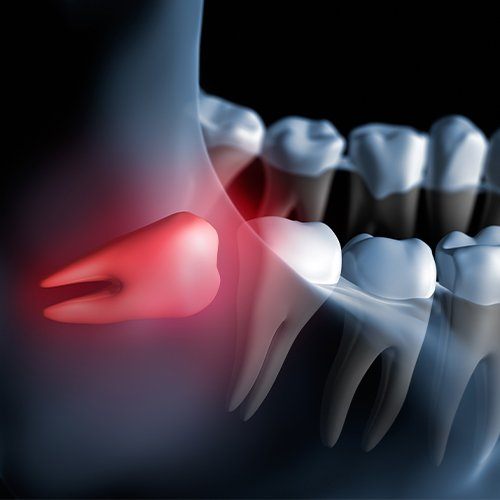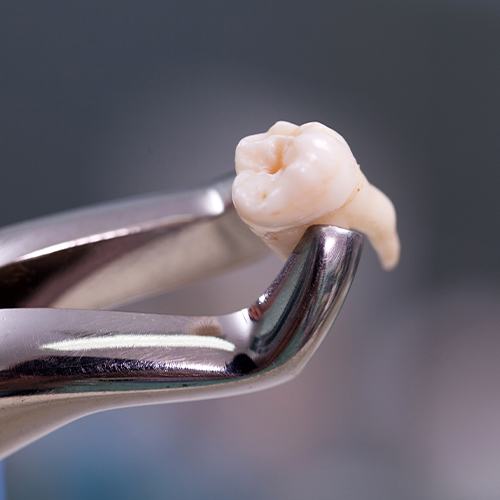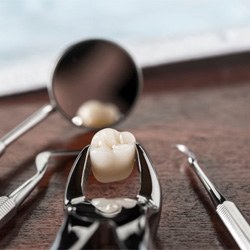Wisdom Tooth Extractions - Arlington Heights, IL
Easy Procedures for Comfortable & Healthy Smiles
Wisdom teeth are a product of evolution, but many people today no longer need them. In fact, for many patients, wisdom teeth can cause serious pain and dental problems if left in the mouth. Thankfully, we provide effective and comfortable wisdom tooth extractions in Arlington Heights, IL to keep our patients happy and smiling. Read on to learn more about this process and why it’s necessary.
Why Choose Westgate Dental Care for Wisdom Tooth Extractions?
-
Dental Sedation
Methods Available -
Pain-Free Wisdom
Tooth Extractions -
Experienced Team
of Dental Experts
Why Are Wisdom Teeth Extracted?

Wisdom teeth are your third set of molars that typically develop in your late teens or early twenties. Sometimes, patients are able to keep their wisdom teeth without any problems, but typically, the jawbone doesn’t have enough space to accommodate them. This can cause problems if they aren’t removed, leading to impacted teeth, where the molars can’t fully break through the gums. We also extract wisdom teeth for these common reasons:
- Crowding can cause damage to other teeth
- Wisdom teeth can push your smile out of alignment
- Wisdom teeth can cause inflammation and pain in the gums
- Extra teeth make it more difficult to care for the already hard to reach areas of the smile
Candidates for Wisdom Tooth Extraction

Typically, we will be monitoring our patients smiles, looking out for your wisdom teeth in our X-rays. We will be able to schedule your appointment before any problems occur. However, wisdom teeth can also appear rapidly in between appointments. You may be able to feel something hard underneath your gums, or you may even see parts of the teeth peeking out. If this occurs, don’t hesitate to contact our dental office!
The Wisdom Tooth Extraction Process

Before beginning, we will ensure that you’re numb and comfortable. We have anesthesia so you won’t have to worry about pain during the procedure. Then, we will make small incisions in the gums to access the wisdom teeth. In some cases, your wisdom teeth may have emerged enough that we can easily extract them all at once. However, more complicated cases may require the division of your tooth, so we can remove it in smaller pieces. Either way, we will keep you relaxed and pain-free. After the teeth are extracted, our expert dentist will clean around the area and stitch it up for a healthy smile.
Aftercare for Wisdom Tooth Extraction

After your wisdom tooth extraction, you should have someone who can safely drive you home. It’s important to rest for the next couple of days, which is why many patients schedule their treatment on Fridays. Avoid drinking through a straw or eating hard/chewy foods during the first 24 hours. Additionally, take our medication and rinse as prescribed to minimize any soreness or discomfort. You should also avoid brushing and flossing the site during the first couple days but be sure to maintain your regular oral healthcare routine. If you have any questions, don’t hesitate to contact our dental office!
Understanding the Cost of Wisdom Tooth Extractions

If you have a wisdom tooth extraction appointment coming up, it’s likely a necessary solution for optimizing your oral health in the long run. Even so, knowing what to expect when it comes to the overall price is important, that way there aren’t any surprises when you see the bill. Our team will evaluate your situation during your initial consultation and provide a more accurate estimate of the price of your treatment. We’ll also discuss the financing options that can make your procedure more manageable for you. Until then, here’s what you should know about the cost of wisdom tooth extractions.
Factors That Can Impact the Cost of Wisdom Tooth Extractions

The price of this treatment will typically vary from patient to patient. Some of the factors our team will consider during your first visit involve:
- The number of teeth : We’ll likely recommend removing all four wisdom teeth in a single appointment. However, not everyone has all four. In some cases, a patient may choose only one or two to be extracted, which can influence the total price.
- Level of impaction : Having impacted wisdom teeth can make the procedure more challenging to perform. The difference between partially erupted teeth and those embedded entirely in the jawbone can significantly affect the cost.
- Type and quantity of sedation : To help patients remain relaxed and comfortable, we will likely offer sedation for a more pleasant experience. The more powerful the form and the higher the amount given, the higher the cost of the procedure.
- Performing surgeon : Some dental practices may need to refer patients out to outside specialists to help perform the extractions, which can end up raising the price. Fortunately, our team won’t need to send you elsewhere to undergo your treatment.
Does Dental Insurance Cover Wisdom Tooth Extractions?

Not every dental insurance company will offer coverage for oral surgeries, but you might be able to receive partial coverage for wisdom tooth extractions. The amount of assistance, however, may be based on factors like meeting your deductible or annual maximum, so you’ll have to verify the details of your plan with your provider before committing to anything. You can also consult our knowledgeable team so that we can help you navigate your policy and make the most of your benefits.
How to Make Wisdom Tooth Extractions Affordable

Even if you don’t have dental insurance, our team at Westgate Dental Care can offer a couple of alternative methods to help make your wisdom tooth extraction more affordable for you. We have an in-house savings plan that can significantly reduce your out-of-pocket expenses on multiple kinds of dental treatments, including wisdom tooth extractions. We’re also partnered with CareCredit, which can help split up the overall price into monthly payments that typically come with low-to-zero interest! This means you’ll be able to pay for your procedure and regain your oral health without worrying about breaking the bank.
Wisdom Tooth Extraction FAQ’s

Curious about wisdom tooth extractions? Please don’t hesitate to contact our office and discuss your concerns directly with one of our friendly team members. However, we also know you may like to prepare on your own, which is why we’ve included the answers to some of the most frequently asked questions about wisdom tooth extractions below. Read on to get the information you need for peace of mind during your upcoming appointment.
My Wisdom Teeth Don’t Hurt. Do I Still Need Them Removed?
One of the main warning signs that you need your wisdom teeth extracted is pain. So, if your wisdom teeth are growing in, and you don’t feel any discomfort, do you still need them extracted? Not necessarily! Your mouth may have enough room for them to grow in without affecting your smile. However, in some cases, we will still need to extract your wisdom teeth even if there isn’t any pain to avoid potential dental complications down the road.
Is It Normal to Be Anxious Before Wisdom Tooth Removal?
Dental anxiety is a common problem with millions of Americans reporting at least some kind of dental fear or nerves. However, this anxiety is automatically heightened if you know you have oral surgery on the horizon. There is no need to worry – this feeling is completely normal. We will do all we can to keep you cool, calm, and collected before, during, and after your procedure.
How Long Does It Take to Recover After Wisdom Tooth Extraction?
In general, it will take a few days for you to recover after your extraction. We recommend taking at least 2 days off work, and maybe more if your job is physically demanding. If you never like to miss work, you can schedule your appointment on a Friday to give yourself the weekend to relax. You must allow yourself a few days to recover because most activity can hurt the healing process. Soreness and discomfort are normal, but if your pain seems to get worse after at least 3 days of recovery, contact our office right away!
Why Are Wisdom Teeth More Difficult to Remove Compared to Others?
Often, wisdom teeth don’t grow like your other teeth because they don’t have enough room. This causes them to become impacted – where the tooth is angled in a position that can’t be extracted simply. In this case, we must section the tooth into different pieces before successfully removing it. Additionally, the roots of wisdom teeth can be shaped in a variety of ways, making it more difficult to extract them.
Can I Be Sedated During My Wisdom Tooth Extraction?
We have various types of sedation that we offer in addition to anesthesia. We will always discuss your specific needs and level of anxiety before your appointment. Our team is committed to helping you stay happy, comfortable, and relaxed throughout the entire process. Prior to your visit, we will review your health and medical history before recommending sedation.
How Should I Prepare for My Wisdom Tooth Extraction?
Before the day of your oral surgery, don’t hesitate to consult your dentist about anything you might have questions or concerns about. They’ll be more than happy to help you prepare by providing you with detailed guidelines on what you should do prior to your appointment. Here are the most common tips:
- Have a friend or family member take you to and from the office since you’ll be under the effects of sedation and/or anesthesia.
- Notify your dentist of any prescribed or over-the-counter medications you take, and if you use alcohol or recreational drugs, that way they can administer the proper dosage of anesthesia for your safety.
- Avoid eating or drinking anything after midnight the night before if you’re receiving general anesthesia.
- Avoid smoking for at least 12 hours before your appointment.
- Buy soft foods that you can eat for several days after your surgery.
- Wear loose clothing to stay comfortable. If you’re receiving IV sedation, wear a short-sleeved shirt or sleeves that can easily be rolled up.
- Wear glasses instead of contacts (if you have any), as your eyes will be closed during your appointment.
How Do You Make Wisdom Teeth Pain Go Away?
If your wisdom teeth are painful and making it incredibly difficult to enjoy your everyday life, then the only certain way to treat this is to have your dentist/oral surgeon remove them. Until you undergo this procedure, make sure to try these home remedies to reduce your discomfort:
- Take over-the-counter painkillers, like ibuprofen, as instructed to help provide relief to your teeth.
- Wrap a towel around a cold compress and place it on the outside of your cheek for 20 minutes at most. By doing this every few hours, you can significantly minimize discomfort and swelling.
- Try oral numbing gel that consists of benzocaine, which can help soothe irritated gums affected by impacted wisdom teeth.
- Rinse your mouth with saltwater, especially around the painful area, as this can help reduce discomfort, soothe agitated tissues, remove trapped food particles, and lower bacterial growth.
Why Do We Have Wisdom Teeth?
Our early human ancestors’ diet typically consisted of raw foods such as uncooked meat, nuts, berries, roots, and leaves. Since they didn’t cut up or process their meals, they had to rely on the strength of their jaws and powerful molars to gnaw and grind their food. Their jaws were also much larger, meaning their wisdom teeth rarely caused issues for them. Today, however, we cook, process, and cut our food, allowing us to enjoy a much softer diet. In turn, our jawbones became much smaller, which doesn’t usually allow enough room for our wisdom teeth to erupt properly. Since we don’t require a very strong bite anymore, this makes our final molars less necessary in modern times.
Does Everyone Have Wisdom Teeth?
Although most people have all four of their wisdom teeth, some people are born with only a few or none at all. According to an article published in the Dental Research Journal in 2015, it’s estimated that between 5% and 37% of the population are missing one or more of their final molars. While the reason for this is still unknown, some suggest that genetics may play a part. Parents who don’t have all of their wisdom teeth may pass this on to their children. Even so, just because wisdom teeth aren’t visible doesn’t mean they aren’t there. The best way to see if they’re there is by taking an X-ray. The majority of people have their final molars emerge around ages 17 and 21, while others may have them come out earlier or later.
I Need a Checkup & Cleaning I am Looking for a Dentist for My Child I am Concerned about Bleeding Gums I Have a Cavity or Broken Tooth I am Missing One or More Teeth I am Unhappy with My Smile I Want a Straighter Smile I am Scared of the Dentist I am in Pain & Need Help I am Concerned about Sleep Apnea View Our Services
